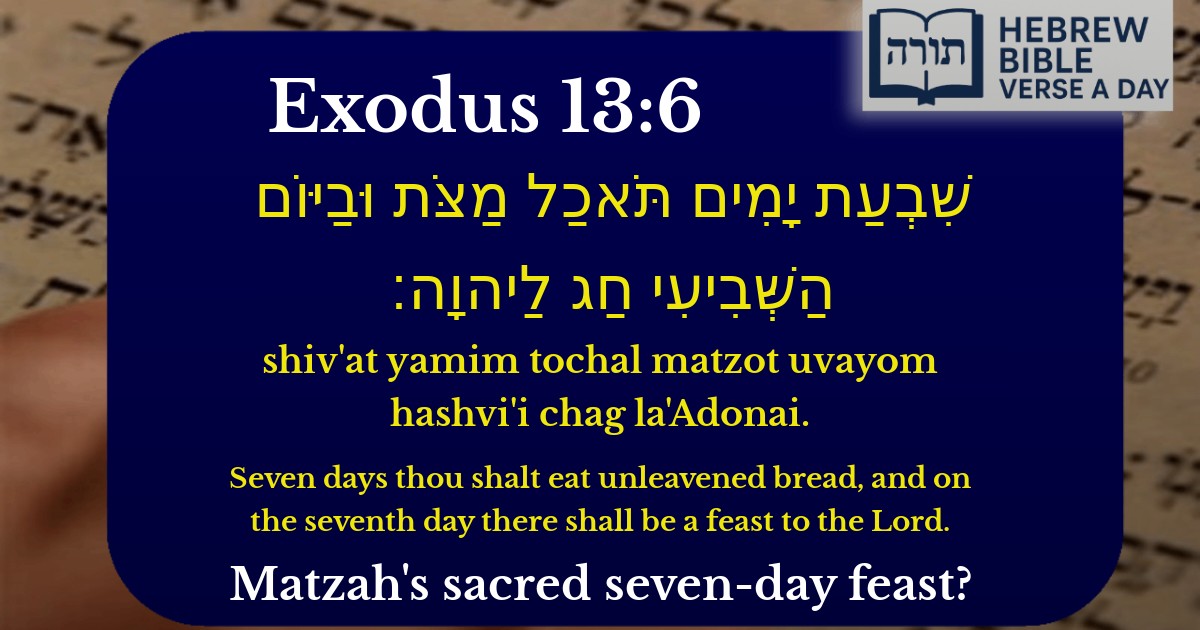Frequently Asked Questions
Q: Why do we eat matzah for seven days during Passover?
A: The Torah commands us to eat matzah (unleavened bread) for seven days to remember the Exodus from Egypt, when the Jewish people left in such haste that their bread did not have time to rise (Exodus 12:39). This is a central mitzvah of Passover, as emphasized in Exodus 13:6.
Q: What is the significance of the seventh day of Passover being called a 'feast to the Lord'?
A: The seventh day of Passover is called a 'feast to the Lord' (Exodus 13:6) because it commemorates the splitting of the Red Sea, a great miracle where God saved the Jewish people from the pursuing Egyptians. According to tradition, this event occurred on the seventh day after leaving Egypt, making it a day of special celebration and gratitude to God.
Q: Is the seventh day of Passover different from the other days?
A: Yes, the seventh day of Passover has special significance. While all seven days involve eating matzah and avoiding chametz (leavened products), the seventh day is called a 'feast to the Lord' (Exodus 13:6) and is treated as a full Yom Tov (festival day) with additional prayers and festive meals, commemorating the miracle at the Red Sea.
Q: Can you explain the deeper meaning behind eating matzah for seven days?
A: Matzah symbolizes both humility (as it is flat and simple) and freedom (as it recalls our hurried departure from Egypt). Eating it for seven days (Exodus 13:6) teaches us to internalize these values—subduing our ego (represented by leavened bread) and recognizing God's role in our redemption. The number seven also represents completeness in Jewish tradition, signifying a full spiritual process.
Q: How do we observe the seventh day of Passover today?
A: Today, we observe the seventh day of Passover as a Yom Tov (festival day), refraining from work, attending synagogue for special prayers (including Hallel and Torah readings about the Red Sea), and enjoying festive meals. It is a day to reflect on God's miracles, as commanded in Exodus 13:6, and to celebrate our freedom with joy and gratitude.


Source and Context
The verse שִׁבְעַת יָמִים תֹּאכַל מַצֹּת וּבַיּוֹם הַשְּׁבִיעִי חַג לַיהוָה׃ (Shemot/Exodus 13:6) appears in the context of the mitzvah of eating matzah during Pesach (Passover). It follows the commandment to observe the festival of Matzot as a commemoration of the Exodus from Egypt.
Explanation of the Verse
The verse commands the Jewish people to eat matzah for seven days and designates the seventh day as a chag laHashem (a festival to the Lord). Rashi (on Shemot 12:15) explains that the seven-day period corresponds to the haste in which Bnei Yisrael left Egypt—so quickly that their dough did not have time to rise. The Rambam (Hilchot Chametz U’Matzah 6:1) emphasizes that eating matzah on Pesach is a Torah obligation, while abstaining from chametz (leavened bread) is a separate prohibition.
The Seventh Day as a Festival
The phrase וּבַיּוֹם הַשְּׁבִיעִי חַג לַיהוָה ("and on the seventh day, a festival to the Lord") is interpreted by the Mechilta (Bo, Masechta DePischa 9) as indicating that the seventh day of Pesach is a Yom Tov (a holy day with restrictions on labor), similar to the first day. The Talmud (Pesachim 68b) discusses whether this day is primarily for rejoicing before Hashem or for personal enjoyment, concluding that it should include both spiritual and physical celebration.
Symbolism of Matzah
Matzah represents both freedom and humility:
Halachic Implications
The Shulchan Aruch (Orach Chaim 490:1) rules that the seventh day of Pesach retains its status as a full Yom Tov, with prohibitions on melacha (forbidden labor) and obligations for festive meals. The Mishna Berurah (490:1) adds that one should increase in simcha (joy) and Torah study on this day, as it marks the splitting of the Yam Suf (Red Sea), a pivotal moment in Jewish history.